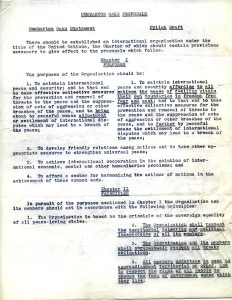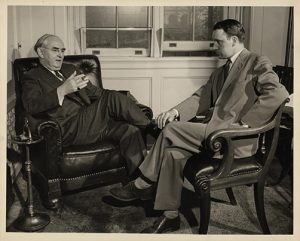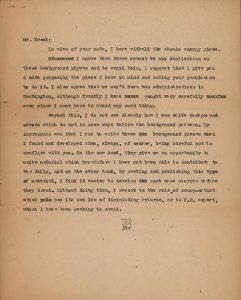Main Exhibit Page | Humble Beginnings | The University of Illinois | A Young Man on the Rise | The Adopted Sulzberger | Credits and Exhibit Sources

Found in RS 26/20/120, Box 27, Correspondence–Moscow trip (1943) and Pulitzer Prize (1945), 1943-48, 1957

Found in RS 26/20/120, Unframed Photos and Awards
A Fateful Encounter at Dumbarton Oaks
Despite his disagreements with Arthur Krock, Scotty distinguished himself among his colleagues. His first major scoop occurred at the Dumbarton Oaks conference in 1944 where the Allies were planning the establishment of the United Nations. Despite the secrecy surrounding the meeting, Scotty had a source within the Chinese delegation. His name was Chen-Yi, a former intern at the New York Times and a friend of the Sulzbergers. Scotty stroked Yi’s ego, congratulating Yi on his ascension to the Chinese delegation. He also lamented that the clandestine nature of the proceedings had the effect of the allies doing a disservice to the world by concealing their positions. Coaxed by Scotty’s praise, Yi gave Scotty documents outlining each country’s proposal. The Washington Bureau released the documents in daily segments and earned Scotty the Pulitzer Prize in 1945 for his reporting at Dumbarton Oaks.[1]
Senator Arthur Vandenberg
Scotty’s notoriety from the Dumbarton Oaks affair caught Republican Senator Arthur Vandenberg’s attention. Vandenberg had presidential ambitions and was speaking on international issues to garner support for the upcoming 1948 election. When he began preparing a speech on U.S./Soviet relations in 1945, he consulted Scotty for advice. Scotty advised Vandenberg to examine the causes of Soviet aggression in Eastern Europe. Additionally, Scotty suggested Vandenberg propose a treaty between the United States and Western European nations to block future German expansion to quell the Soviet anxieties. Vandenberg incorporated Scotty’s ideas into his speech before the Senate on January 10, 1945. The speech was a stunning success, causing Vandenberg to become his party’s preeminent statesman.[2] In his column, Scotty applauded the speech, despite his prior involvement with Vandenberg.[3] In the ensuing years, Scotty’s colleagues would criticize such close relationships with Washington’s elite.[4]
Bureau Chief
In the meantime, Scotty was the new star in the Washington Bureau to the consternation of Arthur Krock. Krock, sensitive to his eroding stature in the face of Reston’s meteoric rise, frequently complained to ASH about Scotty’s analytical articles, which Krock believed undermined his thrice weekly editorial column. AHS ignored Krock’s complaints and favored the continuation of Scotty’s interpretive pieces.[5] By 1953, Krock knew AHS favored Scotty as his eventual replacement. The Washington Post forced his hand when they offered Scotty a position as the paper’s editor. Realizing that AHS did not want to lose his most respected reporter, Krock resigned, although he remained a columnist for the New York Times.[6] On October 1, 1953, Scotty became the Washington Bureau Chief for the New York Times,[7] no longer an outsider looking in. He was now the quintessential Washington insider.

Found in RS 26/20/120, Box 145, Arthur Krock, 1944-1974

Found in RS 26/20/120, Box 145, Arthur Krock, 1944-1974
Continue to: Exhibit Credits and Sources
Footnotes
[1] John F. Stacks, Scotty: James B. Reston and the Rise and Fall of American Journalism (Boston: Little, Brown, 2003), 94-96.
[2] Ibid, 97-99.
[3] Ibid, 97-101; James B. Reston, “The Case for Vandenberg,” Life, May 24, 1948, 101-102.
[4] Edwin L. James to James B. Reston, May 29, 1948, James B. Reston Papers, 1935-1995; Record Series 26/20/120, Box 27, Folder: JBR Letters, 1948, 1954, 1956, 1957, 1961, 1964, University of Illinois Archives; James Reston to Edwin L. James, June 1, 1948, James B. Reston Papers, 1935-1995; Record Series 26/20/120, Box 27, Folder: JBR Letters, 1948, 1954, 1956, 1957, 1961, 1964, University of Illinois Archives; Arthur Sulzberger, “To The Staff,” Undated, James B. Reston Papers, 1935-1995; Record Series 26/20/120, Box 27, Folder: JBR Letters, 1948, 1954, 1956, 1957, 1961, 1964, University of Illinois Archives.
[5] Arthur Hays Sulzberger to Arthur Krock, May 13, 1946, James B. Reston Papers, 1935-1995; Record Series 26/20/120, Box 145, Folder: Krock, Arthur, 1944-1974, University of Illinois Archives; Arthur Krock to Arthur Hays Sulzberger, May 11, 1946, James B. Reston Papers, 1935-1995; Record Series 26/20/120, Box 145, Folder: Krock, Arthur, 1944-1974, University of Illinois Archives; James Reston to Arthur Krock, May 15, 1946, James B. Reston Papers, 1935-1995; Record Series 26/20/120, Box 145, Folder: Krock, Arthur, 1944-1974, University of Illinois Archives. Arthur Krock to James Reston, September 16, 1946, James B. Reston Papers, 1935-1995; Record Series 26/20/120, Box 145, Folder: Krock, Arthur, 1944-1974, University of Illinois Archives; James Reston to Arthur Krock, September 18, 1946, James B. Reston Papers, 1935-1995; Record Series 26/20/120, Box 146, Folder: Krock, Arthur, 1944-1974, University of Illinois Archives; Arthur Krock to James Reston, February 22, 1952, James B. Reston Papers, 1935-1995; Record Series 26/20/120, Box 145, Folder: Krock, Arthur, 1944-1974, University of Illinois Archives; Edmund L. James to Arthur Sulzberger, April 9, 1947, James B. Reston Papers, 1935-1995; Record Series 26/20/120, Box 148, Folder: Sulzberger, A.H., 1943-1969, University of Illinois Archives; Arthur Krock to James Reston, April 29, 1947, James B. Reston Papers, 1935-1995; Record Series 26/20/120, Box 22, Folder: “Stories about people you cite in the book”(Deadline), 1946-47, 1952, 1954-55, 1964, 1977, 1984, University of Illinois Archives. Reston, Deadline, 135.
[6] Stacks, Scotty, 112-113, 158-159; Arthur Krock to Arthur Hays Sulzberger, April 13, 1953, James B. Reston Papers, 1935-1995; Record Series 26/20/120, Box 145, Folder: Krock, Arthur, 1944-1974, University of Illinois Archives; Arthur Hays Sulzberger to Arthur Krock, April 14, 1953, James B. Reston Papers, 1935-1995; Record Series 26/20/120, Box 145, Folder: Krock, Arthur, 1944-1974, University of Illinois Archives.
[7] “Krock of Times to Retire on Oct. 1 As the Washington Correspondent, The New York Times, April 17, 1953, accessed April 26, 2016, ProQuest Historical Databases; William H. Lawrence, “Reston: Reporter’s Reporter,” Times Talk, September 1953, James B. Reston Papers, 1935-1995; Record Series 26/20/120, Box 22, Folder: Reston Biography, 1953, University of Illinois Archives.